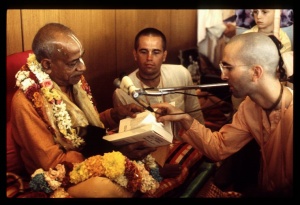CC Madhya 8.102: Difference between revisions
m (1 revision(s)) |
No edit summary |
||
| Line 1: | Line 1: | ||
{{ | [[Category:Sri Caitanya-caritamrta - Madhya-lila Chapter 08|C102]] | ||
<div style="float:left">'''[[Sri Caitanya-caritamrta|Śrī Caitanya-caritāmṛta]] - [[CC Madhya|Madhya-līlā]] - [[CC Madhya 8|Chapter 8: Talks Between Śrī Caitanya Mahāprabhu and Rāmānanda Rāya]]'''</div> | |||
<div style="float:right">[[File:Go-previous.png|link=CC Madhya 8.101|Madhya-līlā 8.101]] '''[[CC Madhya 8.101|Madhya-līlā 8.101]] - [[CC Madhya 8.103|Madhya-līlā 8.103]]''' [[File:Go-next.png|link=CC Madhya 8.103|Madhya-līlā 8.103]]</div> | |||
{{CompareVersions|CC|Madhya 8.102|CC 1975|CC 1996}} | |||
{{RandomImage}} | |||
==== TEXT 102 ==== | ==== TEXT 102 ==== | ||
<div | <div class="verse"> | ||
curi kari’ rādhāke nila gopī-gaṇera ḍare | :curi kari’ rādhāke nila gopī-gaṇera ḍare | ||
anyāpekṣā haile premera gāḍhatā nā sphure | :anyāpekṣā haile premera gāḍhatā nā sphure | ||
</div> | </div> | ||
| Line 12: | Line 16: | ||
==== SYNONYMS ==== | ==== SYNONYMS ==== | ||
<div | <div class="synonyms"> | ||
curi | ''curi kari’''—stealing; ''rādhāke''—Śrīmatī Rādhārāṇī; ''nila''—took away; ''gopī-gaṇera''—of the ''gopīs''; ''ḍare''—out of fear; ''anya-apekṣā''—dependence on others; ''haile''—if there is; ''premera''—of love; ''gāḍhatā''—the intensity; ''nā''—not; ''sphure''—manifests. | ||
</div> | </div> | ||
| Line 19: | Line 23: | ||
==== TRANSLATION ==== | ==== TRANSLATION ==== | ||
<div | <div class="translation"> | ||
“During the rāsa dance Śrī Kṛṣṇa did not exchange loving affairs with Śrīmatī Rādhārāṇī due to the presence of the other gopīs. Because of the dependence of the others, the intensity of love between Rādhā and Kṛṣṇa was not manifest. Therefore He stole Her away. | “During the rāsa dance Śrī Kṛṣṇa did not exchange loving affairs with Śrīmatī Rādhārāṇī due to the presence of the other gopīs. Because of the dependence of the others, the intensity of love between Rādhā and Kṛṣṇa was not manifest. Therefore He stole Her away. | ||
</div> | </div> | ||
| Line 26: | Line 30: | ||
==== PURPORT ==== | ==== PURPORT ==== | ||
<div | <div class="purport"> | ||
Out of fear of the other gopīs, Lord Śrī Kṛṣṇa took Śrīmatī Rādhārāṇī to a secluded place. In this regard, the verse kaṁsārir api (verse 106 in this chapter) will be quoted from the Gīta-govinda of Jayadeva Gosvāmī. | Out of fear of the other ''gopīs'', Lord Śrī Kṛṣṇa took Śrīmatī Rādhārāṇī to a secluded place. In this regard, the verse ''kaṁsārir api'' (verse 106 in this chapter) will be quoted from the ''Gīta-govinda'' of Jayadeva Gosvāmī. | ||
</div> | </div> | ||
__NOTOC__ | |||
<div style="float:right; clear:both;">[[File:Go-previous.png|link=CC Madhya 8.101|Madhya-līlā 8.101]] '''[[CC Madhya 8.101|Madhya-līlā 8.101]] - [[CC Madhya 8.103|Madhya-līlā 8.103]]''' [[File:Go-next.png|link=CC Madhya 8.103|Madhya-līlā 8.103]]</div> | |||
__NOTOC__ | |||
__NOEDITSECTION__ | |||
Revision as of 17:23, 10 August 2021

A.C. Bhaktivedanta Swami Prabhupada
TEXT 102
- curi kari’ rādhāke nila gopī-gaṇera ḍare
- anyāpekṣā haile premera gāḍhatā nā sphure
SYNONYMS
curi kari’—stealing; rādhāke—Śrīmatī Rādhārāṇī; nila—took away; gopī-gaṇera—of the gopīs; ḍare—out of fear; anya-apekṣā—dependence on others; haile—if there is; premera—of love; gāḍhatā—the intensity; nā—not; sphure—manifests.
TRANSLATION
“During the rāsa dance Śrī Kṛṣṇa did not exchange loving affairs with Śrīmatī Rādhārāṇī due to the presence of the other gopīs. Because of the dependence of the others, the intensity of love between Rādhā and Kṛṣṇa was not manifest. Therefore He stole Her away.
PURPORT
Out of fear of the other gopīs, Lord Śrī Kṛṣṇa took Śrīmatī Rādhārāṇī to a secluded place. In this regard, the verse kaṁsārir api (verse 106 in this chapter) will be quoted from the Gīta-govinda of Jayadeva Gosvāmī.